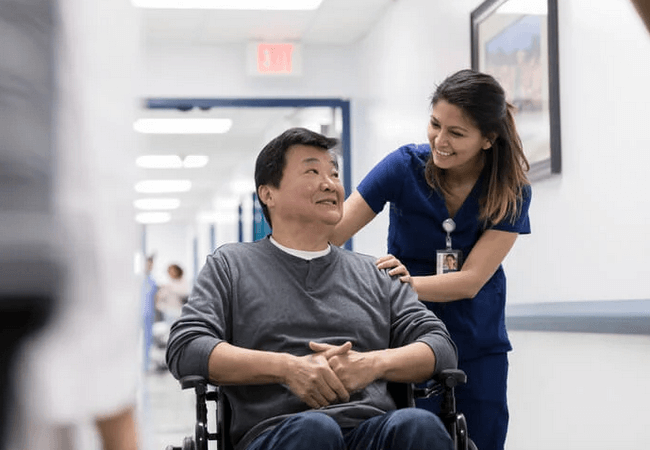Career Guide: Becoming a Nurse Specialized in Disability Care
As of 2021, statistics report that more than 13% of the U.S. population live with some type of disability. This means over 42 million Americans are living with a disability, which has resulted in a high demand for nurses specializing in disability care.
Disabilities can impact anyone and can come in the form of hearing impairments, vision, cognition, mobility, self-care, and independence. Disability care nurses play an important role in improving their quality of life and well-being.
You can follow: 5 Differences Between a Doctor and Nurse Practitioner

If you’re interested in disability care and wondering how long does it take to become a nurse practitioner, we’ll be covering it in our guide. Nurses are often called the foundation and ‘heart’ of healthcare, as they play a vital role in the field and an honorable career pathway.
What is a disability care nurse?
In the healthcare industry, nursing is one of the most versatile roles—with plenty of further education and specialization options available. Disability nursing is just one of the many specialization options.
Disability nursing encompasses a wide range of care, from developmental disabilities to physical impairments. There are different types of disability nurses, including developmental disability/special needs nurses and disability and rehabilitation nurses.
A disability care nurse plays an important part in education and treatment. The nurses teach the patient, family, and carers about the condition and how to manage it. They also assist with working with the patients hands-on, improving their quality of life, like helping with bodily functions, communication, and movement.
What study is required?
The minimum requirement to become a nurse specializing in disability care is to complete a nursing degree and receive a registered nursing (RN) license. There are also optional courses available for further studies in disability care.
The exact requirements and pathways to becoming a nurse, and specializing in disability nursing, in the US will depend on the state. We recommend looking up your state’s guidelines and registered nursing qualification and licensing requirements.
It’s also important to research the requirements of the environment you’re aiming to work in. For example, a hospital’s requirements and qualifications may differ from those of home healthcare.
Where do disability nurses work?
According to the U.S. Bureau of Labor Statistics (BLS), hospitals, physicians’ offices, homes, and schools are where nurses specializing in disability care are most employed.
In hospitals, disability nurses provide direct patient care, administer treatment plans, and coordinate with healthcare teams and specialists. One of the most common places of work for disability nurses is home healthcare situations. In these cases, the nurses visit the patients in their homes, assisting with daily living.
Depending on the disability, this can include helping with bodily functions, communication, movement, and coordinating with family and other caregivers. Educational institutions, like schools, often employ disability nurses to help care for special needs students. This includes identifying how to accommodate them, assisting them with learning, and implementing Individual Education Plans.
Why become a disability nurse?
There are so many pros to becoming a disability care nurse—from increasing your job opportunities, career advancement, personal fulfillment, self-growth, and broadening your work environment.
Working with people with disability can be a great way to improve your care skills and communication abilities. It’s also a great opportunity to work on delivering person-centered patient care and practice independent decision-making.
Depending on your pathway to becoming a disability nurse, further education can open new doorways to career advancement. There’s also a growing demand for nurses with knowledge and education about developmental disorders, mental health conditions, and learning disabilities.
If you want a change of scenery, becoming a disability nurse is a fantastic opportunity. Compared to a general registered nurse, it opens the opportunity to work in varied practice environments, like educational institutions and homes, in a person-centered role.
Specializing in disability care can also be a great opportunity if you’re looking for more fulfillment from nursing. It can be rewarding, to work with patients directly, and see the direct impact your care has on someone’s quality of life.
Job Outlook:
Recent projections from the BLS expect a 6% growth rate for all registered nursing jobs, including those specializing in disability care. This will create approximately 177,400 job openings from 2022 to 2032.
If the employability factor and job outlook are important to you considering becoming a nurse specializing in disability care, we can give you peace of mind. It’s an in-demand position that is only expected to grow in the years to come.
This is because the healthcare industry is always expanding for patients with chronic and permanent disabilities and debilitating mental health issues. This is resulting in the demand for disability and special needs nurses rising.
Specializing in disability can also be a great opportunity if you’re interested in exploring being a nurse educator. The nurse education sector is growing, especially in the demand for educators who are trained in developmental disorders, disabilities, and mental health, so they can train others to do the same.

Maria Khatun Mona is a Founder and Editor of Nursing Exercise Blog. She is a Nursing and Midwifery Expert. Currently she is working as a Registered Nurse at Evercare Hospital, Dhaka, Bangladesh. She has great passion in writing different articles on Nursing and Midwifery. Mail her at “maria.mona023@gmail.com”
